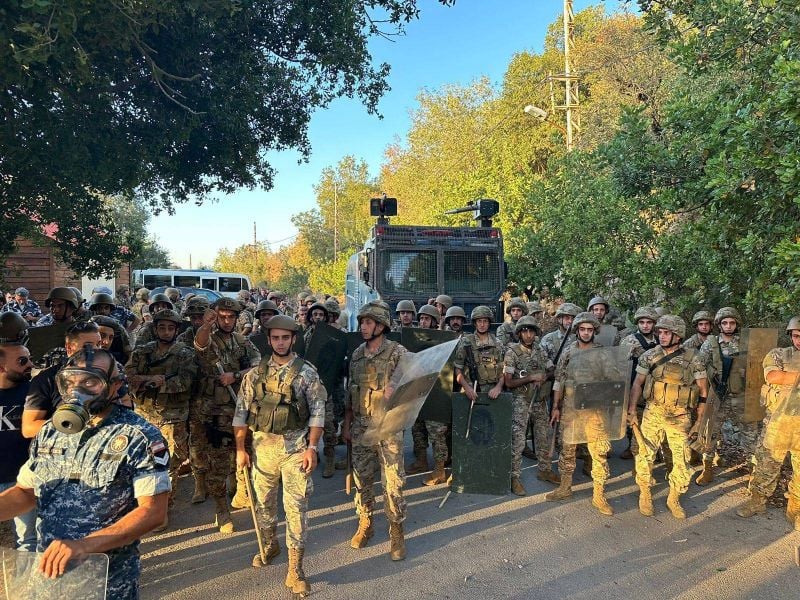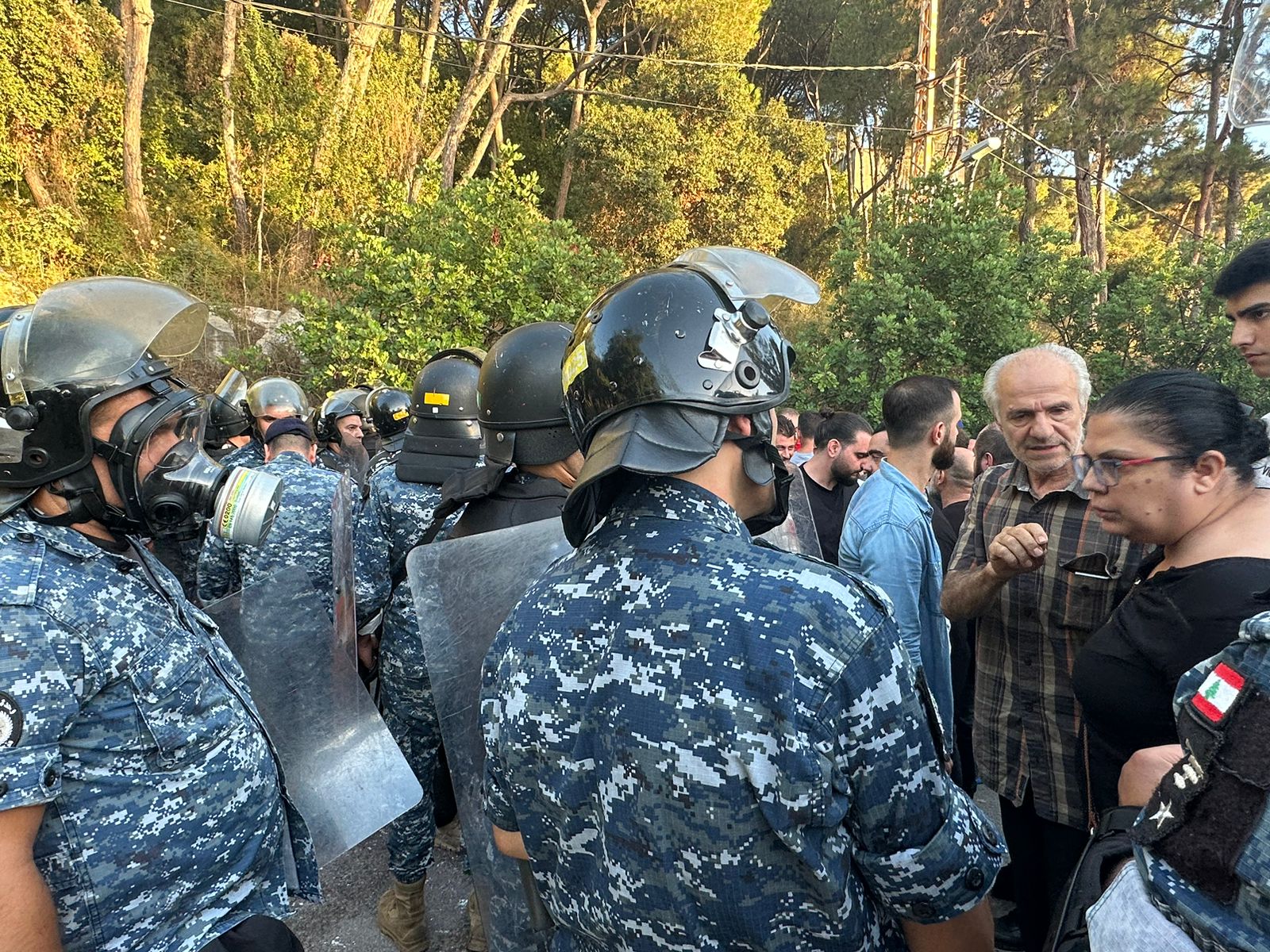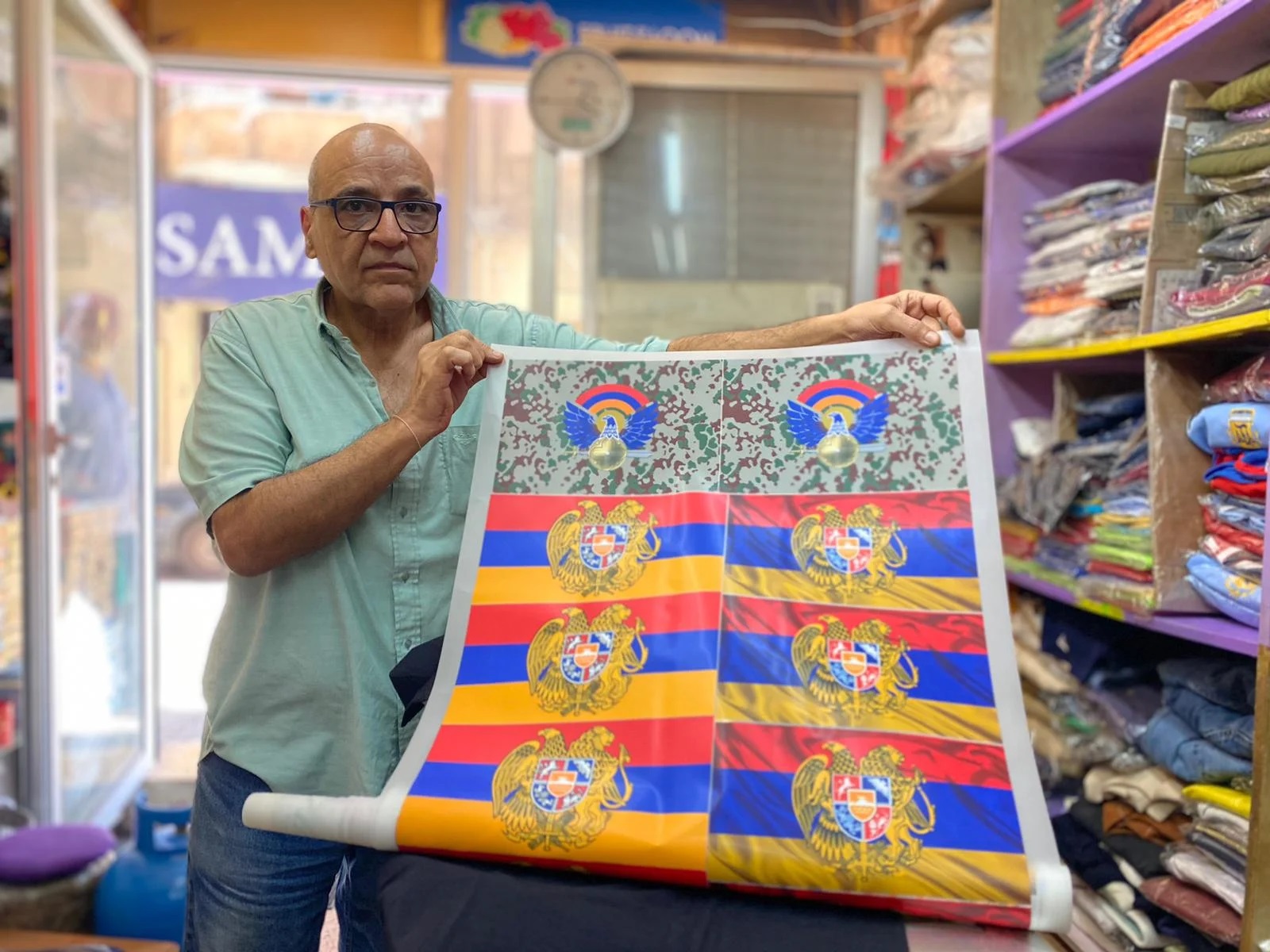
Security forces outside the Embassy of Azerbaijan, Lebanon, September 28 (Credit: Mario Doueiry/L'Orient-Le Jour)
Hundreds of protestors, mainly from the Armenian community in Lebanon, protested outside the Azerbaijan Embassy in Beirut on Thursday against the dissolution of the self-proclaimed republic of Nagorno-Karabakh.
The leader of the region, Samvel Shahramanyan, announced Thursday that Nagorno-Karabakh will cease to exist in the new year and that he signed an order dissolving all state institutions on Jan. 1 of this year.
The region is recognized internationally as part of Azerbaijan, but Armenia has controlled it for three decades since the collapse of the Soviet Union in the 1990s. Security forces stood in front of protesters outside the Embassy of Azerbaijan, Lebanon, Sept. 28 (Credit: Mario Doueiry/L'Orient-Le Jour)
Security forces stood in front of protesters outside the Embassy of Azerbaijan, Lebanon, Sept. 28 (Credit: Mario Doueiry/L'Orient-Le Jour)
Tensions at the sit-in
The sit-in was marked by tensions between the protesters and security forces, who used tear gas to disperse the crowd. Internal Security Forces were present in large numbers around the embassy, where access was restricted by barbed wire.
A spokesperson for the protesters said he feared a "new Armenian genocide" and denounced the "lack of intervention by the international community" in the face of developments in Nagorno-Karabakh.
Demonstrators chanted slogans accusing the Armenian Prime Minister of being "guilty" for the rapid fall of the separatist region into the hands of Baku.
The government of Yerevan did not intervene militarily to support it during an attack by Azeri forces last week.
“We are all Nagorno-Karabakh,” protestors chanted.
"We are not terrorists! Priests were beaten up," said one protestor.
MP and Secretary General of the Tachnag party Hagop Pakradounian, who is of Armenian origin, declared that "when Armenians are killed, we are not peaceful people."
Shortly before 7 p.m., tensions between demonstrators and security forces flared up again, leaving dozens injured. They were evacuated by the Red Cross.
L'Orient-Le Jour found that some of the people treated for asphyxiation by the Lebanese Red Cross were children.
When contacted, Internal Security Forces were unable to comment on the scuffles, and the army could not be reached.
Since Baku's victory, thousands of inhabitants of Nagorno-Karabakh have sought refuge in Armenia.
In that same afternoon, the Armenian community in Bourj Hammoud, Lebanon, was called to join the protests.
Sat in his textiles shop, Yeghia Srourian told L'Orient-Le Jour: "We have lost a battle, but we have not lost the war. It's just the beginning and we will continue to protest. It's not the last time."
"We want our children to see that we are alive and fighting for our country. It is our country and our churches that we are losing … against the Turks and now against the world ... I want to live in peace in Armenia and I want my children to live there in peace,” he concluded.
 Yeghia Srourian shows a poster of Armenian flags in his shop in Bourj Hammoud, Beirut, ahead of the demonstration in front of the Embassy of Azerbaijan, Sept. 28. (Credit: Olivia Le Poidevin/L'Orient Today))
Yeghia Srourian shows a poster of Armenian flags in his shop in Bourj Hammoud, Beirut, ahead of the demonstration in front of the Embassy of Azerbaijan, Sept. 28. (Credit: Olivia Le Poidevin/L'Orient Today))
L'Orient Le Jour tried to reach the Embassy of Azerbaijan in Lebanon for comment, but it has not responded.
Nagorno-Karabakh is a region with an Armenian majority, which seceded from Azerbaijan when the USSR disintegrated. For more than three decades, it has been at odds with Baku, notably in two active wars between 1988 and 1994, and in the autumn of 2020.
But last week, Azerbaijan launched a military offensive to retake it, forcing the separatists to capitulate within 24 hours, without the intervention of Russian peacekeepers deployed there since late 2020.
Armenia, which has supported this territory for decades, did not intervene militarily this time either, paving the way for the region's reintegration into Azerbaijan.
Since then, tens of thousands of Armenians fled the arrival of Azerbaijani troops, fearing repression and violence via the Latchine corridor, which is the only road linking Nagorno-Karabakh to Armenia. It was reopened on Sunday by Baku after months of blockade.
